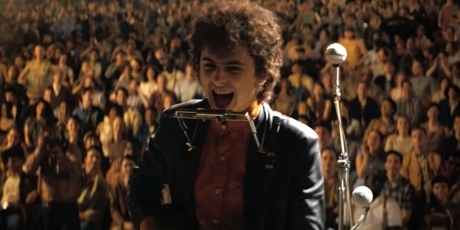Arts
You are here
A Complete Unknown – Dylan and the rise of radical politics in the 60s

February 14, 2025
James Mangold’s new biopic about Bob Dylan, the 83-year old singer songwriter, wisely focuses on a very specific period of Dylan’s life – the four years from 1961-1965 when Dylan, at the age of 19, moved to NYC as the ‘complete unknown’ he was then.
Timothée Chalamet in the lead role does a very difficult thing. He manages to take on Dylan’s tone and cadences without turning the performance into simply an imitation. He and the other actors, portraying Pete Seeger (Edward Norton), Joan Baez (Monica Barbaro) and Johnny Cash (Boyd Holbrook), do their own singing and playing live to the camera, which heightens the authenticity and immediacy of their musical performances.
Given the amount of time given over to singing and performing it could almost seem like A Complete Unknown is a musical but it’s rather that the music moves the story forward. And if there’s one true and knowable thing we can say about Dylan, it’s that his entire life has been like one (very long, at this point) concert tour.
In fact, he has just announced more dates in his never-ending tour. His Rough and Rowdy Ways 2025 tour dates now include stops in Little Rock, Arkansas; Omaha, Nebraska; Peoria, Illinois; Kalamazoo, Michigan; and Toledo, Ohio. The sizes of the crowds don’t seem to matter to Dylan.
I saw him a few years ago in my hometown of Saskatoon in the prairies – not a big-city venue. The auditorium was maybe half-full but that didn’t seem to matter to Dylan. In fact, shortly after playing there he was going to Moose Jaw, a much smaller city in the south of the province.
Mangold’s film documents Dylan’s rise from the complete unknown he was when he arrived in New York City from Hibbing, Minnesota to rise relatively quickly in the folk firmament. It shows his meeting with Pete Seeger and going to visit Woody Guthrie, one of Dylan’s early heroes, who was by that time very sick and dying from complications of Huntington's disease.
And in a similar vein to Guthrie, Dylan came to represent for his generation, particularly in the period the film covers, the spirit of resistance and rebellion that Guthrie was speaking to in the dust bowl thirties. Many of his songs continue to resonate today, political songs like Masters of War, The times they are a-changin' or A hard rain’s gonna fall.
There is a scene in the movie where the young Bob is watching JFK on television talking about the possibility of nuclear attacks on Cuba during the Bay of Pigs crisis. The crisis passes but we get a bit of a sense of the times he was living through.
We see real footage of the March on Washington in 1963 with Bob (Chalamet) singing ‘Only a Pawn in their Game’, about how poor whites are duped into going along with racism because they have been convinced that the colour of their skin somehow makes them ‘better’ than Blacks, thereby allowing the US government and capitalists to more easily exploit and oppressing all workers and the poor.
The politics in the movie are not the main focus, but we do get a glimpse of how Dylan’s early relationship with Suze Rotolo (the character named ‘Sophie’ in the movie and played by Elle Fanning) may have politicized him and influenced his musical output. She worked with CORE (Congress of Racial Equality) that was involved in organizing the Freedom Riders who went into the deep south to organize Black voters and to fight against segregation. Dylan has since admitted the influence Rotolo had on his understanding of the world at the time.
Dylan is famously enigmatic and loathe to answer media questions directly, mostly because of how stupid and reductionist the questions often were, particularly at the beginning of his fame. We can see, even in the way the Chalamet carries himself as Dylan in the movie, how much he feels the need to protect himself by wearing dark glasses, hunching his shoulders and refusing to meet people eye to eye, that he is trying to escape the ‘famiosity’ which makes him extremely uncomfortable.
Mangold doesn’t shy away from portraying the more prickly sides of Dylan’s personality – the egotism and sometimes sexism that Joan Baez (Barbaro) notes, “You know Bob, sometimes you can be a real asshole.”
But what shines through Chalamet’s performance and those of his fellow actors is the beauty of the words and the music and the excitement of being young and alive at a time of incredible ferment and rebellion.
When Dylan shocks his supporters (like Pete Seeger) and some of the audience members at the 1965 Newport Folk Festival by ‘going electric’ and expanding the boundaries of his music we see the future. A poet (Dylan says this is how he sees himself above all else) and a musician who has carried his words and music through the creation of 55 albums to being the only singer-songwriter to win the Nobel Prize in Literature in 2016. The prize was awarded to him "for having created new poetic expressions within the great American song tradition".
Chalamet himself said that he didn’t know much about Dylan or his music before he started preparing for the film. He also didn’t meet Dylan before or after doing the movie: “But my honest feeling is, as Jim [Mangold, the director] said before, we've gotten something like 55 albums from this man. His contribution to the American artistic scene of the last 60 years is monumental. So, if I ever did meet him, I would just say thank you. And not thank you for the role, not thank you for the opportunity. Thank you for your work.” If all this new movie does is introduce younger people to Dylan’s poetry and music, it will be doing a great deal.
Section:
Topics:










